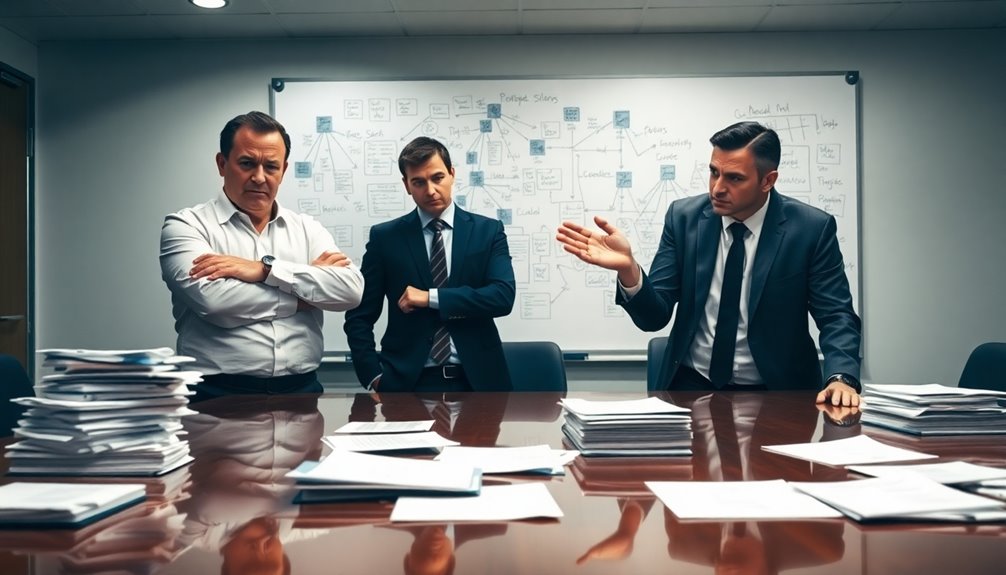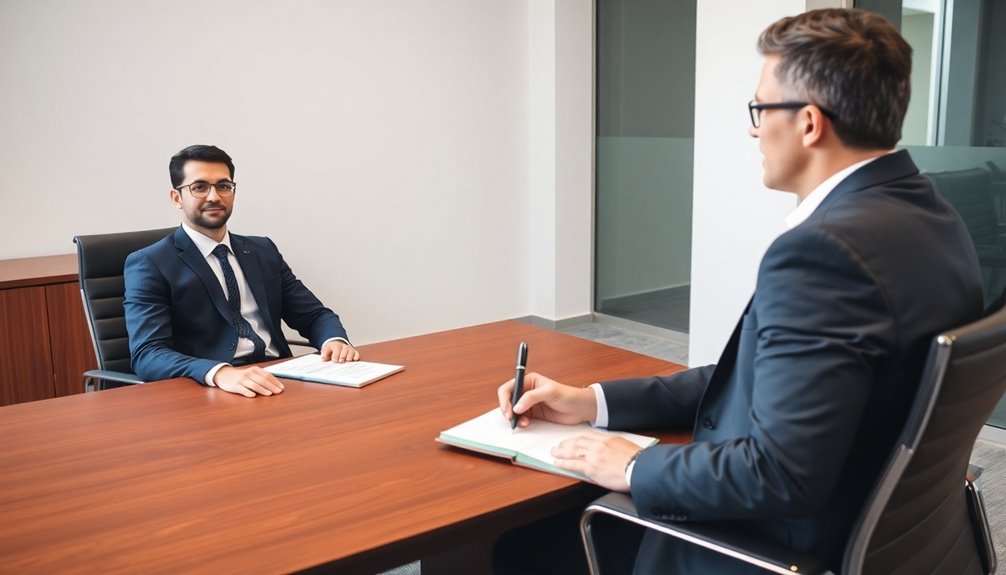Dealing with challenges with difficult colleagues can be tough, but understanding team dynamics helps. Start by identifying specific issues, like communication breakdowns or conflicting priorities. Use techniques like active listening and clear, direct language to express your feelings while remaining calm. Focus on the behavior affecting work, not personal traits, to keep things professional. A clear resolution strategy, like the STAR method, can guide conversations towards positive outcomes. By reflecting on these interactions, you'll improve future collaborations. There's plenty more to uncover about effective communication and strategies to manage those tricky relationships.
Key Takeaways
- Practice active listening to understand the perspectives of difficult colleagues and foster a respectful dialogue.
- Maintain professionalism by focusing on specific behaviors rather than personal attributes during conflicts.
- Use clear and direct language to express your thoughts and minimize misunderstandings.
- Implement the STAR method to structure conversations and effectively communicate issues and solutions.
- Follow up on discussions to ensure clarity, commitment, and continued collaboration after resolving challenges.
Understanding Team Dynamics

Understanding team dynamics is essential for fostering effective collaboration and communication among colleagues. You need to recognize that each team member brings unique skills, perspectives, and personalities to the table.
By appreciating these differences, you can create a more inclusive environment that encourages open dialogue and creativity. It's important to establish clear roles and responsibilities, ensuring everyone knows what's expected of them.
When conflicts arise, understanding the underlying dynamics helps you address issues constructively. You should also promote trust and respect within the team, as these elements are critical for successful collaboration.
Identifying Specific Challenges

When managing the complexities of teamwork, pinpointing specific challenges is essential for effective resolution. You might face issues like communication breakdowns, differing work styles, or conflicting priorities. Identifying these challenges requires keen observation and an open mindset.
Ask yourself how a colleague's behavior impacts your work and the team's overall performance. It's vital to focus on actions rather than personal traits; this helps maintain objectivity.
Reflect on situations where misunderstandings arose, and consider how varying perspectives contributed to the conflict. By examining these factors, you'll gain clarity on the specific hurdles you face. This understanding sets the stage for developing targeted strategies to navigate and resolve conflicts, ultimately improving team collaboration and productivity. Additionally, recognizing the role of topical authority can enhance your approach to conflict resolution by fostering a more informed and cohesive team environment.
Techniques for Effective Communication

Effective communication is essential for maneuvering challenges with difficult colleagues. Start by actively listening; it shows respect and helps you understand their perspective.
Use clear, direct language when expressing your thoughts to avoid misunderstandings. Focus on "I" statements to convey your feelings without sounding accusatory, like saying, "I feel overwhelmed when deadlines are missed."
Stay calm and composed, even if emotions run high. Be open to feedback and encourage a two-way dialogue, fostering a collaborative atmosphere.
When disagreements arise, seek to find common ground rather than escalating tensions. Finally, follow up on conversations to guarantee clarity and reinforce your commitment to resolving issues. Additionally, engaging in online communities can provide support and diverse perspectives that enhance your communication skills and resilience in difficult situations.
Maintaining Professionalism

Maintaining professionalism in the workplace is essential, especially when maneuvering challenges with difficult colleagues. You need to stay calm and composed, ensuring your responses are objective rather than emotional.
Focus on the specific behaviors affecting your work, rather than personal traits of your colleagues. Demonstrating professionalism means listening actively and communicating effectively, even in tense situations.
By prioritizing problem-solving over personal feelings, you can navigate conflicts more smoothly. Remember, your demeanor sets the tone for interactions; when you remain respectful and constructive, you encourage the same from others.
This approach not only fosters a positive work environment but also enhances your reputation as a reliable team member, capable of handling challenges with grace and integrity.
Resolution Strategies and Outcomes

Maneuvering conflicts with difficult colleagues requires a clear strategy for resolution and an understanding of the potential outcomes.
Start by identifying the specific issue at hand, and address it directly through open communication. Use the STAR method to structure your responses, focusing on the Situation, Task, Action, and Result.
It's essential to maintain objectivity, avoiding negative comments about your colleague. Instead, highlight your actions and their impact on work performance.
Once you implement a resolution, reflect on the outcomes—did collaboration improve? Did misunderstandings lessen?
These insights not only aid in resolving the current conflict but also enhance your problem-solving skills for future challenges.
Learning From Difficult Situations

Difficult situations with colleagues often serve as valuable learning experiences that can shape your professional growth. When you face challenges, take a moment to reflect on what the situation teaches you about collaboration and communication.
Identify the specific actions that contributed to the conflict and consider your role in it. This self-reflection helps you develop greater self-awareness and accountability. Embrace the lessons learned and use them to improve your future interactions.
By focusing on problem-solving rather than personal feelings, you'll enhance your conflict resolution skills. Remember, every difficult encounter is an opportunity to cultivate patience, empathy, and adaptability—traits that are essential for success in any workplace.
Ultimately, these experiences can lead to stronger relationships and a more resilient professional mindset.
Real-Life Examples and Insights

Conflict can often lead to unexpected insights and growth in the workplace.
When managing challenges with difficult colleagues, you might discover valuable lessons. Here are some key takeaways from real-life experiences:
- Patience: An experienced director learned that a lunch discussion about workload adjustments improved efficiency.
- Open Communication: An entry-level fellow found that discussing negative feedback with a mentor led to better collaboration.
- Problem-Solving: A team member's conflict resolution skills turned misunderstandings into a resource-sharing schedule.
These examples show that tackling conflicts head-on can transform relationships and enhance teamwork.
Embracing these challenges not only fosters personal growth but also strengthens your ability to manage complex workplace dynamics effectively.
Frequently Asked Questions
How Can I Improve My Emotional Intelligence in Team Settings?
To improve your emotional intelligence in team settings, start by actively listening to your colleagues. Pay attention to their non-verbal cues and emotions.
Practice empathy by trying to understand their perspectives. Reflect on your own feelings and reactions during interactions.
Seek feedback on your communication style and adjust accordingly. Finally, engage in self-awareness exercises, like journaling, to identify your emotional triggers.
These steps will enhance your ability to connect and collaborate effectively.
What Signs Indicate a Colleague May Be Difficult to Work With?
When you're evaluating a colleague's work style, look for signs like constant negativity, a lack of accountability, or poor communication skills.
If they frequently dismiss feedback or struggle to collaborate, it could indicate challenges ahead.
You might notice their unwillingness to compromise or adapt, which can hinder teamwork.
Pay attention to how they respond under pressure; if they react defensively, it's a red flag that working together could be difficult.
How Do Personality Types Affect Team Collaboration and Conflict?
Like different instruments in an orchestra, personality types shape team collaboration and conflict.
You'll notice that some individuals harmonize effortlessly, while others clash. For instance, analytical types might prioritize data over emotions, causing friction with empathetic colleagues.
When you recognize these differences, you can adapt your approach, fostering understanding and cooperation.
Embracing diverse personalities enhances creativity and problem-solving, turning potential discord into a symphony of collaboration that benefits everyone involved.
When Should I Escalate a Conflict to Management?
You should escalate a conflict to management when efforts to resolve it directly haven't worked.
If the issue persists, impacts team morale, or hinders productivity, it's time to involve higher-ups.
Make certain to document your attempts at resolution and present clear evidence of the conflict's effects.
This guarantees management understands the situation thoroughly and can provide the necessary support to address the issue effectively.
Trust your judgment, and don't hesitate to seek help.
What Are the Long-Term Effects of Unresolved Conflicts on Teams?
Unresolved conflicts can fester like a wound, slowly draining a team's morale and productivity.
You'll notice trust eroding, communication faltering, and collaboration becoming a distant memory.
Over time, these tensions can breed resentment, leading to high turnover and disengagement.
If you don't address issues, you risk creating a toxic environment where innovation stifles.
Ultimately, unresolved conflicts can hinder not just individual growth, but the collective success of your team.
Conclusion
In managing the challenges posed by difficult colleagues, you've got the tools to turn potential conflicts into opportunities. Remember, it's all about keeping the lines of communication open and maintaining professionalism. By focusing on solutions and learning from each situation, you can foster a more collaborative atmosphere. When you embrace these strategies, you'll find that every cloud has a silver lining, ultimately enhancing team synergy and paving the way for your personal and professional growth.









